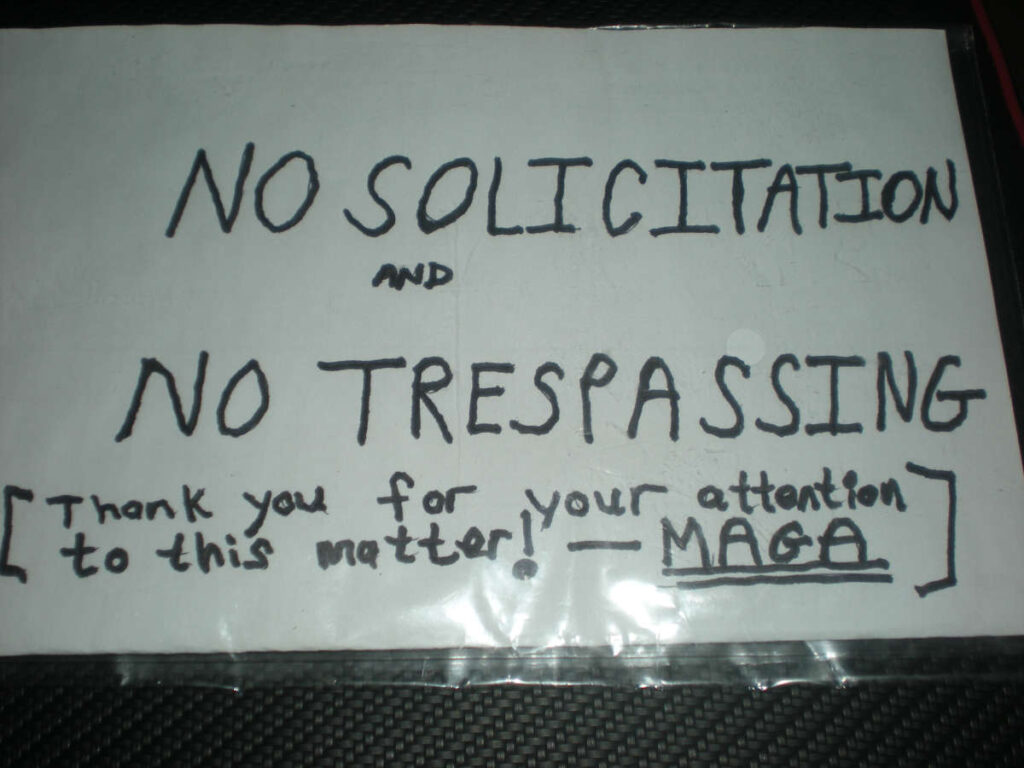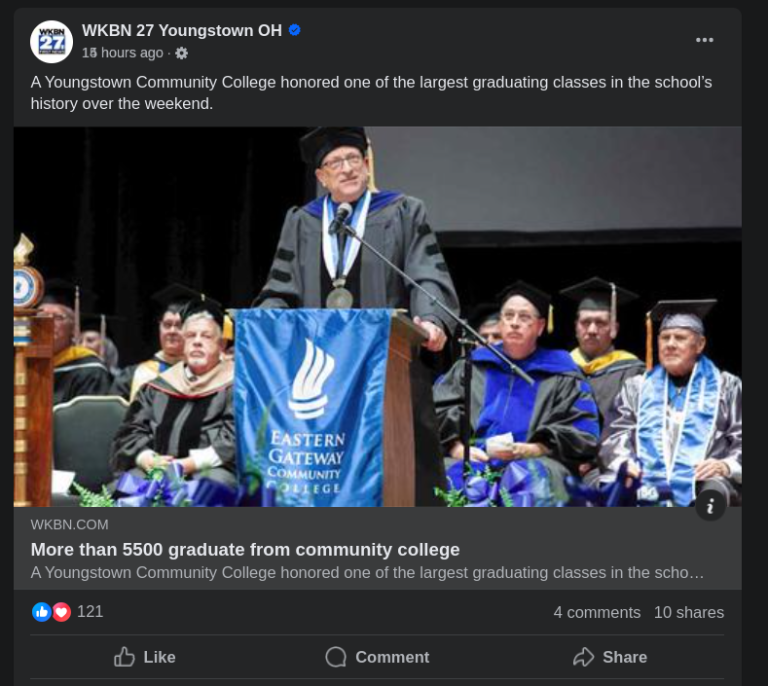To put an end to door-to-door solicitation, I put up this sign stating the following:

“No Solicitation and No Trespassing. Thank you for your attention to this matter! ~MAGA”
Backstory
In the past, I’d come home to fliers for various services attached to my front door knob or stuffed in the door jam, mostly related to construction and landscaping (windows, gutters, roofing, lawn) or Internet/digital services (mainly, Spectrum/Time Warner). In late spring to early summer, while working from a home office, I began to experience first-hand door-to-door solicitors pounding obtrusively on the door.
I didn’t answer the door for the first couple of times. However, in June I answered the door to be greeted by two ladies claiming to be selling Spectrum Internet and TV services. The first lady asked whether I was interested in Spectrum’s services and I said no. She accepted my response.
Not to be left out, her partner quickly doubled-down by saying Spectrum had some really good deals, and asking what provider I used for Internet. She then said Spectrum also had attractive TV deals. I told her I don’t watch TV and don’t even own a TV. She looked baffled. At that point, they decided to leave.
A week or so later, I was again working from home. This time I was on a telephone call. I had a couple of the front windows open. Suddenly, I heard a lady saying loudly and repeatedly from the front yard, “hello…hello…hello” before even approaching the door to knock. She eventually banged on the door a couple of times like a police officer engaged in a knock-and-talk expedition.
In conducting a “knock and talk,” police knock (often aggressively) and confront individuals at their front doors (often late at night or early in the morning) in an effort to coerce them into “voluntarily” allowing the police into their home, with the ultimate goal of obtaining incriminating evidence against them or those residing within the home.
Although courts have embraced the fiction that “knock and talks” are “voluntary” encounters that are no different from other door-to-door canvassing, these constitutionally dubious tactics are highly threatening confrontations meant to intimidate individuals into allowing police access to a home, which then paves the way for a warrantless search of the home and property.
The Rutherford Institue: Constitutional Q&A: Knock-and-Talk Police Tactics
After I ignored her being a nuisance and disturbing my peace, she roamed around for a while, and then went to my neighbor’s house. That was in late June.
At that point I said, “Enough is enough!“
Later that day I hand wrote my FAFO (f*ck around, find out) sign and attached it to the front door. Since then, I’ve received no fliers or solicitors!
FAFO Sign
In a way, my hand written sign is brilliant. It conveys FAFO without actually stating it explicitly. I think the three flags, one which is battle worn, that are valiantly waving by my Victory Garden adds an extra touch of “this person is probably a MAGA hillbilly.”
What I don’t like is that the federal law actually enables solicitation under the First Amendment claiming “freedom of speech” and “freedom of the press.” Private property trumps those claims, at least that’s my interpretation of the writings of our Founding Fathers, even though I disagree with them regarding whether or not the government (federal, state, or local) may assess property taxes provided it’s equitable and for the public good.
My opinion is that property should be sacred, including real, intangible, and derivative property (fruits of one’s labor, for instance). Whatever taxes that governments want to assess on property should be on a voluntary basis, primarily. If a nontrivial number of people actually consent to taxation for government provided services, especially property taxes, then why wouldn’t they voluntarily contribute? Why is force by government necessary to obtain “consent” in a so-called free society? That’s an oxymoron and largely one of the flawed premises of the Founding Fathers and those who continue to enable actions such as property wealth confiscation (property taxes) and income taxation.
In a fully free society, taxation—or, to be exact, payment for governmental services—would be voluntary. Since the proper services of a government—the police, the armed forces, the law courts—are demonstrably needed by individual citizens and affect their interests directly, the citizens would (and should) be willing to pay for such services, as they pay for insurance.
The question of how to implement the principle of voluntary government financing—how to determine the best means of applying it in practice—is a very complex one and belongs to the field of the philosophy of law. The task of political philosophy is only to establish the nature of the principle and to demonstrate that it is practicable. The choice of a specific method of implementation is more than premature today—since the principle will be practicable only in a fully free society, a society whose government has been constitutionally reduced to its proper, basic functions.
Ayn Rand Lexicon: “Government Financing in a Free Society,”
The Virtue of Selfishness, 116
But I digress.
Back on point, and setting aside the taxation elements, some, if not many, courts at the state and local level lean towards personal property rights and the insights of the Founding Fathers.
My perspective is that no solicitors should be enabled by law to access personal private property to solicit, including political canvassers, census workers, and pollsters. They should be required to obtain a right by the property owner (or renter) to do so. This concept should be extended to law enforcement (LE), too. LE should not be permitted to engage in “knock-and-talk” without a warrant or an objectively documented emergency.
Regarding the latter, and as highlighted previously, it has been shown that LE such as Sheriff’s Deputies will enage in knock-and-talk at a residence to ask questions (and fish for incriminating evidence), sometimes in the middle of the night. Citizens don’t have to answer any questions and don’t have to open the door unless the LE present a signed and dated Warrant by a judge or adequately explain the emergency.
Solicitation Laws
Nevertheless, the federal law enables solicitation, which in turn enables disturbance of peace, nuisance of the peace, and derivative crimes on person and property.
When in doubt, though, follow the money.
This “law” doesn’t seem to support the rights of We the People, but rather seems to work against us. This law states that solicitors may essentially access private property to essentially interfere or disturb the peace of private property owners or renters provided they are soliciting (selling something or gathering information for polls and such). This law is somewhat absurd, in my opinion. Under freedom of speech, they may do so from a public space, such as a sidewalk, road, public park, and such. Think about this law. It makes it legal for solicitors to walk up to the door or window of a home, knock, loudly make their presence known, even peer into open windows or doors, yet the same government makes it illegal for these same people to simply put a flier into a mail box at the street. It doesn’t make sense…until one asks, “cui bono.”
A person or organization that wants to solicit on private property should be required to obtain written approval by the property renter or owner. In contrast, the current law requires the property owner to actually formally request a right of privacy and no solicitation from the government itself! Interestingly, in the digital world, the laws are in place in many jurisdictions (mostly outside the USA) that require solicitors (digital marketing advertisers and such) to first obtain documentation of an opt-in. Sure, it’s not well enforced and difficult to do so, but the law is intentional and well reasoned in favor of the rights of individuals over that of organizations.
Court Decisions
In other words, even though private property (and really a right to personal privacy) is one of the foundational concepts presented by the Founding Fathers, our Supreme Court over-ruled both local and state laws and courts in Ohio to enable residential solicitation. Doing so is clearly an advantage to businesses, even though one of the primary rulings related to religion.
Jehovah’s Witness | Northeast Ohio | 1943 Ruling
Facts of the case:
The 1943 Supreme Court case of Martin v. City of Struthers, 319 U.S. 141 referenced Thelma Martin, a Jehovah’s Witness in Struthers, Ohio (Mahoning County in Northeast Ohio, just 15 miles from my homestead). She had canvassed neighborhoods knocking on doors and ringing doorbells to distribute leaflets promoting a meeting. She was convicted and fined $10 for violating a city ordinance that prohibited a person who was distributing leaflets and other flyers from knocking on doors and ringing doorbells. She appealed her conviction in the Circuit Court of Mahoning County, alleging that the city ordinance violated her First Amendment free speech and free press rights. The Circuit Court upheld the ordinance and her conviction. The Supreme Court of Ohio dismissed her appeal.
In a 5-4 decision, the Court reversed the Supreme Court of Ohio and held Struthers’ ordinance unconstitutional. In the majority opinion written by Justice Hugo L. Black, the Court acknowledged the city’s interest in preventing crime and reducing nuisances. However, alternative solutions, such as trespassing laws, were also available that could achieve the city’s purpose. Activities like Martin’s were “so clearly vital to the preservation of a free society that, putting aside reasonable police and health regulations of time and manner of distribution, it must be fully preserved.” The ordinance was overly restrictive on door-to-door distributors, and therefore unconstitutional.
Ways to Counter It (Unwanted Solicitation)
- Construct a Fence: Although constructing a fence, ideally a 10-foot tall brick wall surrounding the property with iron gates to access the driveway, is a great solution, it is not practical for the vast majority of people due to the cost alone.
- File a Request: Another option is for a property owner or renter to file and obtain a “no solicitation” request with the state or local government. I looked into this. The government wants all sorts of personal information to be shared with them. No thank you.
- DIY Signage: I found the best practical solution to unwanted solicitation is the DIY one I used. I simply chose to put up a sign that is clearly visible with no uncertain terms about my interests. Also, because the
corruptat-times compromised Supreme Court wrote in its 1943 ruling that solicitation is more of a trespassing issue, I included “no trespassing” on my FAFO sign. So far, it has worked. Spectrum and other solicitors have chosen not to “find out.”
Effectiveness of DIY Solution
Nevertheless, this type of sign still doesn’t prevent scammers, urban thugs, and other criminals from openly accessing the property under the guise of “solicitation,” since I don’t have this sign prominently placed at access points around the property. As such, potential perpetrators would only be breaking the law if they actually ignored a sign that is clearly visible and persisted to do so or engaged in “solicitation” after permitted hours established at the local or state level (past dawn and dusk, generally).
Revision of Laws
We should have the opposite law: that no solicitors or others may access private property for non-emergencies (exceptions for utility workers and such, of course, but with limitations). The consequences should incorporate, with some limitations again, a broadened stand-your-ground and castle doctrine that would extend, say, 100 feet from one’s physical home. This law would practically eliminate most personal property crime.
Nevertheless, it seems a meaningful number of laws are not in place to protect the Citizens, but rather to protect and enable certain behaviors and interests of organizations, often related to financial benefits (the “cui bono”). Often, elected officials, lobbyists, and bureaucrats will push forth these types of laws in exchange for personal benefits such as cash, keeping a job (or obtaining a future job), book deals, and such (basically, quid-pro-quo—this for that—back-door arrangements).
Closing Words
What is your opinion about, and experience with, residential solicitation?

